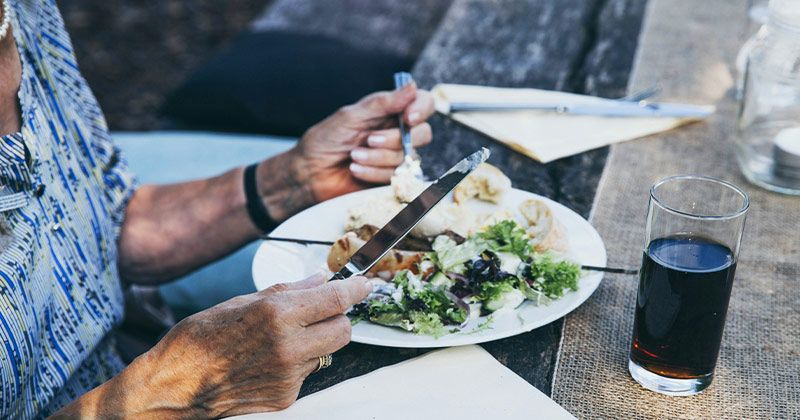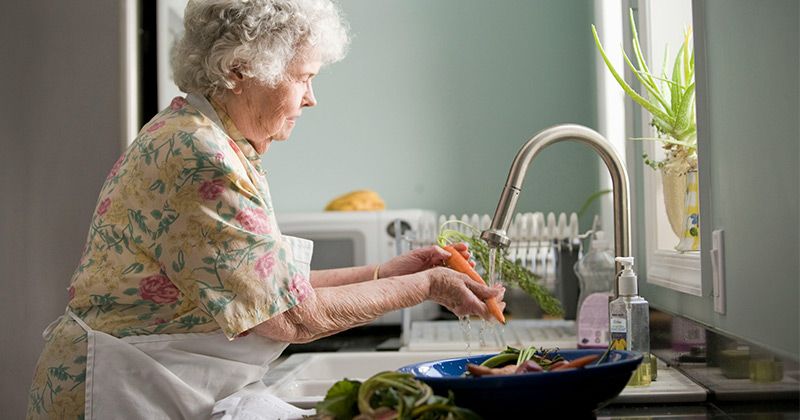This infographic offers a comprehensive overview of Activities of Daily Living (ADLs), which are essential self-care tasks crucial for maintaining independence and well-being. ADL include ba...

Nutrition FAQs for Dementia Care
by Erin Barnes, Customer Success Advisor & Recreation Therapist
8-minute read
1. Why is it important to eat well?
Food is one of our basic needs. Preparing and eating meals are vital activities for remaining independent. Preparing meals and eating are part of the activities of instrumental and daily living necessary to remain independent. Without sufficient intake, the body may enter a fasting mode, using muscles as fuel.
Proper nutrition supports muscle strength, overall health, and cognitive function. A balanced diet helps:
- Preserve muscle mass: Prevents the body from breaking down its tissues for energy.
- Enhance mental well-being: Mealtimes provide opportunities for social interaction, which positively impacts mental health.
2. Does dementia have an impact on appetite?
The short answer is, yes, dementia can affect appetite. For example:
- Frontotemporal dementia may increase cravings for sweet foods.
- Lewy body dementia and Parkinson’s disease can cause loss of smell and taste.
- Alzheimer’s disease usually does not significantly change appetite until the disease is very advanced.
Cognitive impairment can make meal preparation and consumption more challenging.
3. What are the consequences of cognitive disorders on the preparation and consumption of meals?
Dementias affect people’s ability to organize their meals. This is, for some, the first sign of a memory problem.
As dementia progresses, challenges include:
- Managing meals: Difficulty with grocery shopping, cooking, and remembering to eat.
- Using kitchen appliances: Cognitive decline can make this more hazardous.
- Feeding oneself: Advanced dementia may impair the ability to feed oneself, requiring support and adjustments.
4. When should you worry about feeding a loved one?
Sometimes we all forget food going bad in our fridge. However, if you find large amounts of stale food in your loved one’s fridge, ask yourself questions. At the other extreme, if the fridge always stays empty on every visit or if it never empties, that could be another sign. Another clue: your loved one eats with great delight when you bring them food but does not seem to eat the rest of the time.
Remember especially that if your loved one loses weight (5-10% of their usual weight in a few months), you must try to understand if it is because they eat less, and if so, why? You should also talk to a health care professional as weight loss could be caused by other illnesses (such as diabetes, abdominal issues, etc.).
Look for these signs:
- Stale food: Large amounts in the fridge or an empty fridge could indicate problems.
- Eating habits: Eating only when you bring food or not eating regularly may be a concern.
- Weight loss: Significant loss (5-10% over a few months) should be discussed with a healthcare professional.
5. Are there protective foods for Alzheimer’s? Food supplements or a special diet?
No. No scientific study has identified that a specific food, supplement, or diet, protects against Alzheimer’s disease or other dementias. However, a varied and balanced diet is associated with contributing towards a better cardiovascular system and therefore better general health, which in turn is beneficial for the brain.
6. How to Manage Nutrition in Advanced Dementia?
In more advanced dementia, difficulty swallowing (dysphagia) can occur. Consider these tips:
- Adapt food textures: Choose softer foods that are easier to chew and swallow.
- Manage swallowing difficulties: Adapting food textures can help prevent risks like aspiration pneumonia.
- Use reminders: Tools like the Idem clock can help manage meal and hydration schedules by providing prompts to ensure regular eating and drinking.
7. How Can Adapted Tableware Assist with Dementia Care?
Adapted tableware can make mealtimes more manageable for individuals living with dementia by addressing common challenges:
- Non-Slip Mats: Help prevent dishes from sliding around, making it easier to eat independently.
- Specially Designed Utensils: Ergonomic utensils with larger handles can be easier to grip and use.
- Bowl with High Sides: Helps prevent spills and makes scooping food easier.
- Plate Guards: Prevent food from being pushed off the plate, making it simpler to eat.
- Cup Holders: Ensure cups stay in place and are easier to drink from.
These adaptations can help maintain dignity and independence during mealtimes, reducing frustration and enhancing the overall dining experience. We also suggest that you talk to your loved one’s health professionals: eating well is essential, whether you have a cognitive disorder or not.
Conclusion
Proper nutrition is vital for individuals living with dementia, impacting both physical health and quality of life. Understanding how dementia affects appetite, meal preparation, and eating habits can guide caregivers in providing better support. Adapting food textures and using reminders, such as the Idem clock, can improve mealtimes and hydration, while adapted tableware can enhance independence and reduce mealtime frustration. For personalized advice on products, the Eugeria team is available to assist.
For specific medical questions or concerns, consulting with healthcare professionals is recommended to ensure optimal care and well-being.

